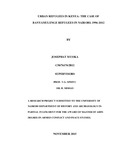| dc.description.abstract | This study is to explore the problems faced by urban refugees in Kenya and specifically
Banyamulenge refugees from Democratic Republic of Congo. They have faced many
problems since their arrival and settlement in Nairobi in the year 1998. Their problems
include contested citizenship, refugee to refugee conflict in the refugee camps and access
to basic needs. The issues have not received adequate attention from scholers and therefore
there is need for more study to fill this gap.
The study is embedded in the theory of push and pull that was advanced by Earnest G,
Raventstein who argued that, it is a normal habit for human beings to migrate. He added
that migration is governed by push and pull factors. The refugees in question vacated their
state of origin due to persecution; they were pushed out of Congo and were pulled to
Kenya in Nairobi by factors like security and basic necessities where they sought refuge.
Alex Honneth’s theory of struggle for recognition also was applied and used through this
work and in that Banyamulenge refugees struggled to be recognized by the government
and other urban communities in Kenya for their survival through coping.
The research objectives were to examine the origin of Banyamulenge refugees in Nairobi.
Their migration to Kenya was confirmed by the respondents and the hypothesis suggested
that ethnic clashes caused generation of Banyamulenge refugees Nairobi and it was
confirmed. The settlement of Banyamulenge refugees in Kenya was examined and the
hypothesis suggested that they settled in Nairobi to access basic needs and it tested
partially positive since there were other factors like refugee to refugee conflict. The
objective was to assess to the impact of Banyamulenge refugees in Nairobi and the
hypothesis suggested that Kenyan government and host communities had positive response
from the impact and have no problem with Banyamulenge refugees in Nairobi hence it was
disapproved since Banyamulenge refugees experienced both negative and positive
responses and tested negative like requirement to have work permit in Kenya. That is one
of the negative response from the government. Highlighted coping mechanisms were
interrogated and several coping methods were identified hence the hypothesis that
Banyamulenge have adopted coping mechanisms to sustain their settlement and survival
was confirmed.
In methodology, both primary and secondary data sources were utilized in writing this
work. Major finding was that Banyamulenge refugees are still facing problems in Kenya as
urban refugees. It is recommended that international community should facilitate peace and
their citizenship in Congo or facilitate integration in Kenya through funding. | en_US |

